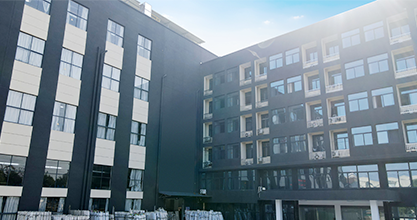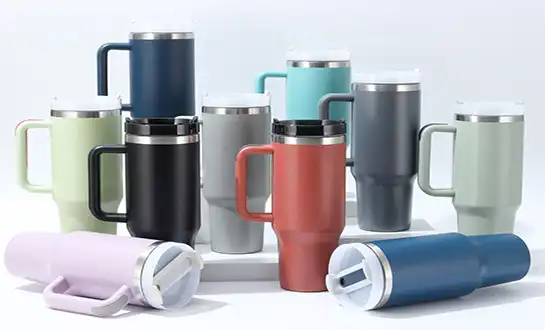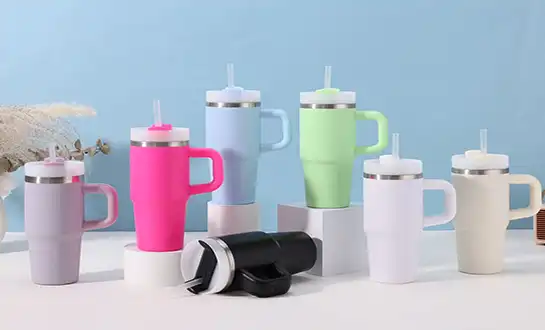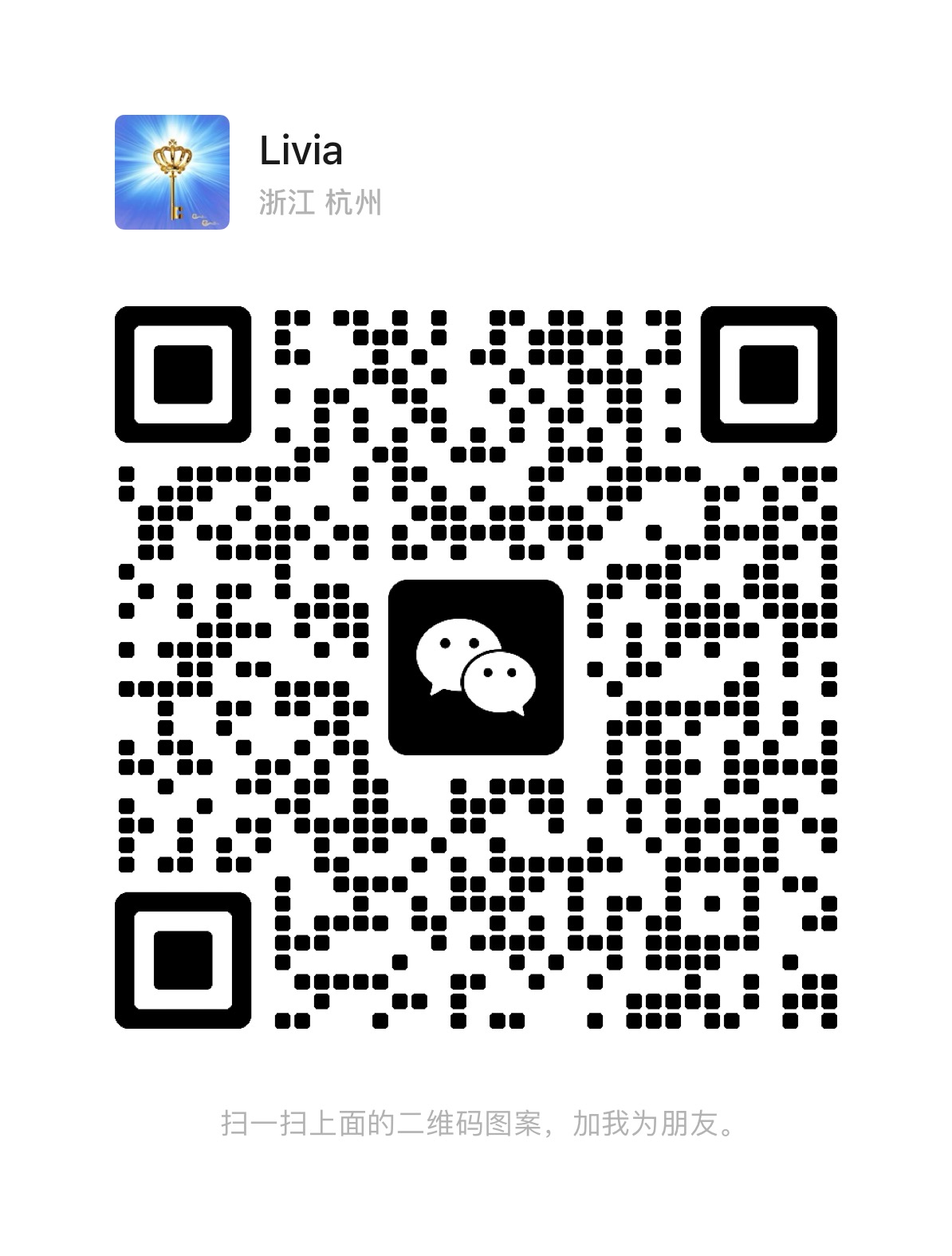Best Thermos Bottles for Export in 2025: Global Supplier Comparison
The global drinkware market continues to evolve rapidly, with thermos bottles emerging as one of the most sought-after products for international trade in 2025. As sustainability concerns drive consumer preferences toward reusable alternatives, businesses worldwide are seeking reliable suppliers who can deliver high-quality thermos bottles that meet diverse market demands. This comprehensive analysis examines the leading global suppliers, manufacturing capabilities, and market trends that define the thermos bottle export landscape this year. Whether you're a distributor, retailer, or brand looking to source premium thermos bottles, understanding supplier capabilities, quality standards, and customization options has become crucial for success in today's competitive marketplace. The following comparison will guide you through the essential factors that distinguish top-tier suppliers from the rest, helping you make informed decisions for your thermos bottle sourcing needs.
Key Factors in Selecting Export-Quality Thermos Bottle Suppliers
Manufacturing Capacity and Production Capabilities
Modern thermos bottle manufacturing requires substantial production capacity to meet growing global demand. Leading suppliers in 2025 operate advanced automatic production lines capable of producing 1.5 million pieces per month or more, ensuring they can handle large-scale orders without compromising delivery timelines. These facilities typically feature state-of-the-art stainless steel processing equipment, vacuum insulation technology, and comprehensive quality control systems. The most reliable manufacturers have invested heavily in automation to maintain consistent product quality while reducing human error and production costs. When evaluating suppliers, businesses should prioritize those with proven track records of scaling production efficiently. Companies like Topnovo have demonstrated this capability through rapid expansion and continuous investment in production infrastructure since their establishment. The ability to maintain consistent output while adapting to seasonal demand fluctuations distinguishes premium suppliers from smaller operations. Additionally, suppliers with diverse product portfolios, including water bottles, mugs, and other drinkware items, often provide better value through economies of scale and reduced shipping costs for mixed orders.
Quality Control and Certification Standards
International markets demand rigorous quality standards for thermos bottles, making certification compliance a critical factor in supplier selection. Top-tier manufacturers maintain comprehensive quality control processes with multiple inspection points throughout production. The most reliable suppliers typically implement 20-step quality check procedures that catch potential defects early, ensuring only products meeting international standards reach customers. Essential certifications include BSCI for social compliance, FDA approval for food safety, and LEAD FREE certification for consumer protection. These certifications demonstrate a supplier's commitment to meeting global regulatory requirements and protecting end consumers. Beyond basic certifications, leading suppliers often hold additional quality management system certifications like ISO 9001, which indicates systematic approaches to quality control and continuous improvement. The complaint rate serves as another crucial indicator of quality consistency, with premium suppliers achieving complaint rates below 2‰ and maintaining long-term relationships with 86% of customers over six years. This level of quality consistency results from investing in advanced testing equipment, training programs for quality control staff, and maintaining strict adherence to international standards throughout the manufacturing process.
Supply Chain Management and Logistics
Efficient supply chain management directly impacts delivery reliability and cost-effectiveness in thermos bottle exports. Leading suppliers maintain robust supply chain networks with abundant resources to enrich product offerings and adapt to market changes quickly. This includes strategic partnerships with raw material suppliers, component manufacturers, and logistics providers to ensure uninterrupted production flow. The most successful export suppliers achieve on-time delivery rates of 98% or higher by implementing sophisticated inventory management systems and maintaining buffer stocks of popular SKUs. These suppliers typically stock over 10 standard product variants to enable quick order fulfillment and reduce lead times for standard products. Advanced suppliers also maintain flexible logistics arrangements that can accommodate various shipping requirements, from small sample orders to large container shipments. They work closely with international freight forwarders and understand the documentation requirements for different destination markets. This logistical expertise becomes particularly valuable when dealing with time-sensitive orders or navigating changing international trade regulations. Suppliers with established logistics networks can often provide better shipping rates and more reliable delivery schedules, directly benefiting their export customers' bottom lines.
Customization Options and Design Capabilities for Export Markets
Advanced Manufacturing Customization Services
Export success in the thermos bottle market increasingly depends on suppliers' ability to provide comprehensive customization services that meet diverse regional preferences and brand requirements. Leading manufacturers offer extensive OEM and ODM services that encompass shape customization, lid design, and structural modifications to create unique products for specific markets. The development process for custom thermos bottles typically requires 3 months minimum, involving detailed collaboration between clients and experienced R&D teams. This process begins with initial idea discussions, progresses through 3D drawing confirmation, and includes prototype sample creation within 7 days. The molding phase, requiring 35-65 days, represents the most critical stage where precision manufacturing capabilities distinguish professional suppliers from basic manufacturers. Top suppliers maintain dedicated R&D teams with innovation-focused approaches that can transform client concepts into market-ready products. These teams understand international market trends, regulatory requirements, and manufacturing constraints that affect design feasibility. The most capable suppliers also protect client intellectual property through confidentiality agreements and can assist with design registration and patent applications in various markets. This comprehensive support extends beyond basic manufacturing to include market analysis and product positioning advice that helps clients succeed in competitive export markets.
Surface Treatment and Finishing Options
Surface treatment diversity has become a key differentiator among thermos bottle suppliers, with leading manufacturers offering extensive finishing options to meet varied aesthetic preferences across global markets. Premium suppliers provide comprehensive coating options including powder coating, ombre multi-color applications, matte and glossy painting, glitter finishes, ice flower patterns, luminous paint, sublimation printing, and electroplating. Each finishing technique requires specialized equipment and expertise to achieve consistent results across large production runs. Powder coating remains popular for its durability and color consistency, while ombre effects create premium visual appeal that commands higher retail prices. Sublimation printing enables complex graphic applications that resist fading and maintain vibrancy through extended use. Electroplating options provide metallic finishes that appeal to luxury market segments and corporate gift applications. The most advanced suppliers maintain quality control standards across all finishing options, ensuring color consistency, adhesion strength, and durability testing for each surface treatment method. They also understand market-specific preferences, such as matte finishes being preferred in European markets while glossy surfaces perform better in Asian markets. This knowledge helps clients select appropriate finishing options for their target markets and avoid costly mistakes in product positioning.
Logo Application and Branding Solutions
Brand differentiation through professional logo application represents a critical success factor for thermos bottle exports, requiring suppliers with comprehensive marking capabilities and attention to detail. Leading suppliers offer multiple logo application methods including silkscreen printing, laser engraving, embossing, heat transfer, 3D UV printing, water decal gold application, air transfer, and water transfer techniques. Each method provides distinct visual characteristics and durability levels suitable for different brand positioning strategies. Silkscreen printing offers cost-effective solutions for simple logos with solid colors, while laser engraving provides permanent marking that withstands extensive use and washing cycles. Embossing creates tactile brand experiences that appeal to premium market segments, and 3D UV printing enables complex multi-color designs with raised textures. The most capable suppliers maintain color matching capabilities that ensure brand consistency across different production runs and surface treatments. They understand trademark requirements for international markets and can advise on logo sizing, placement, and legal compliance issues. Advanced suppliers also provide mock-up services and sample productions that allow clients to evaluate different logo application methods before committing to large orders. This comprehensive approach to branding support helps ensure that thermos bottles effectively represent client brands in competitive export markets while meeting all regulatory requirements for logo marking and product identification.
Market Trends and Export Opportunities in 2025
Sustainability Drive and Eco-Friendly Product Demand
Environmental consciousness continues reshaping the global thermos bottle market in 2025, with sustainability becoming the primary driver for both consumer purchasing decisions and corporate procurement policies. Leading suppliers recognize this trend by focusing on designing and producing increasingly sustainable drinkware products that minimize environmental impact throughout their lifecycle. This includes selecting recyclable materials, implementing energy-efficient manufacturing processes, and developing products with extended usability periods that reduce replacement frequency. The most forward-thinking suppliers have adopted circular economy principles, designing thermos bottles for disassembly and material recovery at end-of-life. Consumer awareness of plastic pollution has accelerated demand for high-quality stainless steel alternatives that provide superior performance while eliminating single-use packaging waste. Export opportunities have expanded significantly in markets where government regulations increasingly favor reusable products over disposable alternatives. European Union initiatives targeting single-use plastics have created substantial opportunities for quality thermos bottle suppliers who can demonstrate compliance with environmental standards. Similarly, corporate sustainability initiatives in North American markets drive bulk purchasing of branded thermos bottles for employee gifts and promotional campaigns. Suppliers who can provide verified sustainability credentials, including carbon footprint calculations and lifecycle assessments, gain competitive advantages in these environmentally conscious markets.
Regional Market Preferences and Cultural Adaptations
Understanding regional preferences has become essential for successful thermos bottle exports, as different markets demonstrate distinct preferences for design elements, functionality features, and cultural symbolism. Asian markets typically favor compact designs with innovative lid mechanisms and bright color options, while European consumers prioritize minimalist aesthetics, premium materials, and subtle branding approaches. North American markets show strong demand for large-capacity options suitable for outdoor activities, sports applications, and workplace use throughout extended work days. The most successful export suppliers maintain detailed market intelligence about these preferences and can adapt their product offerings accordingly. Cultural considerations also influence color selection, with certain colors carrying different meanings across various markets that affect consumer acceptance. Religious and cultural symbols must be carefully considered when developing designs for specific regional markets to avoid unintentional offense or market rejection. Leading suppliers work closely with local distributors and market research firms to understand these nuances and develop products that resonate with target demographics. This cultural sensitivity extends to packaging design, instruction materials, and marketing messaging that accompany exported products. Suppliers who invest in understanding these cultural factors often achieve higher success rates in new market penetration and build stronger long-term relationships with international distributors and retailers.
Technology Integration and Smart Features
Technological advancement integration represents an emerging opportunity area for thermos bottle exports, with smart features becoming increasingly popular among tech-savvy consumers worldwide. Advanced suppliers are developing products with temperature monitoring capabilities, hydration tracking systems, and smartphone connectivity that provide added value beyond basic insulation performance. These technological enhancements require suppliers with sophisticated R&D capabilities and partnerships with electronics component manufacturers. The integration challenge involves maintaining traditional thermos bottle functionality while incorporating delicate electronic components that must withstand daily use conditions. Leading suppliers address this through innovative design approaches that protect electronic elements while preserving the essential durability and insulation performance that consumers expect from quality thermos bottles. Market research indicates strong demand for these enhanced products in professional environments, fitness applications, and health-conscious consumer segments. Export opportunities exist particularly in developed markets where consumers demonstrate willingness to pay premium prices for enhanced functionality. However, successful technology integration requires understanding regional regulatory requirements for electronic devices, battery safety standards, and wireless communication compliance. The most capable suppliers maintain expertise in these regulatory areas and can navigate the complex approval processes required for technology-enhanced products in various international markets. This technological capability increasingly distinguishes premium suppliers from traditional manufacturers and creates new market opportunities for innovative product development.
Conclusion
The thermos bottle export landscape in 2025 demands suppliers who combine manufacturing excellence with comprehensive service capabilities and market understanding. Success requires more than basic production capacity; it demands quality consistency, customization flexibility, and deep understanding of regional market preferences. Leading suppliers distinguish themselves through certified quality processes, innovative R&D capabilities, and reliable delivery performance that builds long-term customer relationships. As sustainability drives continued market growth and technological integration creates new opportunities, businesses must partner with suppliers who can adapt to evolving demands while maintaining consistent quality standards.
Ready to elevate your thermos bottle sourcing strategy with a proven industry leader? Topnovo brings seven years of specialized expertise, innovative R&D capabilities, and an impressive 98% on-time delivery rate to partnership opportunities. Our comprehensive OEM/ODM services, combined with BSCI, FDA, and LEAD FREE certifications, ensure your products meet the highest international standards. With 86% of our customers maintaining partnerships over six years and complaint rates below 2‰, we deliver the reliability your business demands. Whether you need custom designs, bulk production, or market-specific adaptations, our experienced team transforms your vision into market-ready products. Contact our sales team today at sales01@topnovolife.com to discover how our flexible customization services and strict quality control processes can drive your business growth in the expanding global thermos bottle market.
References
1. Global Drinkware Market Analysis Report 2025. International Trade Research Institute, 2025.
2. Sustainable Packaging Trends in Consumer Goods Manufacturing. Environmental Commerce Journal, Vol. 42, 2025.
3. Quality Standards and Certification Requirements for Exported Drinkware Products. International Manufacturing Compliance Review, 2025.
4. Regional Consumer Preferences in Thermal Insulation Products: A Cross-Cultural Study. Global Marketing Research Quarterly, Issue 1, 2025.
5. Technology Integration in Traditional Drinkware: Market Opportunities and Challenges. Innovation in Consumer Products Magazine, March 2025.
6. Supply Chain Management Best Practices for Export-Oriented Manufacturing. International Business Operations Journal, 2025.

Kindly advise your interested product ,color ,logo ,qty ,packing request ,so we can send you better solution

Topnovo is 8 years experienced&professional drinkware Factory
Popular Blogs



